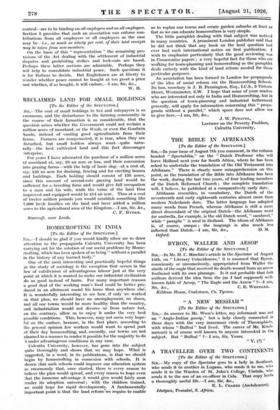HOMECROFTING IN INDIA
[To the Editor of the SPECTATOR.] SIR,--I should be glad if you would kindly allow me to draw attention to the propaganda Calcutta University has been carrying out for the solution of our social problems by Home- crofting, which has been spoken of as being " without a parallel in the history of any learned body."
One of the most interesting and practically hopeful things in the study of sociology is the exception that occurs in the Jaw of subdivision of advantageous labour just at the very point at which it is wanted to make our industrial civilization do us good instead of harm. For many important reasons a good deal of the working man's food could be better pro- duced in an allotment round his home than anywhere else. It is wonderfully interesting to see how, if only we worked on that plan, we should have no unemployment, no slums, and all our towns would be more healthy than the country, and industrialism would not divorce us from nature but, on the contrary, allow us to enjoy it under the very best possible conditions. This, however, may not seem very hop& rul on the surface, because, in the first place, according to the general opinion few workers would want to spend part of their day homecrofting, and, secondly, our towns are not planned in a manner to render it possible for the majority to do under advantageous conditions in any case.
Calcutta University, however, has gone into the subject quite thoroughly and shows that we may hope. What is suggested, in a word, in its publications, is that we should begin by homecrofting in connexion with schools. It is shown that such schools could improve our education system so enormously that, once started, there is every reason to believe the plan would spread, and every reason to hope even that the immense advantage it would give would fairly soon render its adoption universal ; with the children trained, we could hope for rapid developments. A fundamentally important point is that the land reform we require to enable us to replan our towns and create garden suburbs at least as fast as we can educate homecrofters is very simple.
The little pamphlet dealing with that subject was noticed in many countries. A prominent London publisher said that he did not think that any book on the land question had ever had such international notice on first publication. I wish to emphasize particularly that the good reviewing was in Conservative papers ; a very hopeful fact for those who are working for town-planning and homecrofting as the pamphlet deals entirely with the kind of land reform needed for those particular purposes.
An association has been -forined in London for propaganda
of the idea of social reform via the Homecrofting Schools. Its hon. secretary is J. B. Pennington, Esq., I.C.S., 3 Victoria Street, Westminster, S.W. I hope that some of your readers who are interested not only in India and Homecrofting, but in the question of town-planning and industrial betterment generally, will apply for information concerning this "propa- ganda without a parallel," which space does not allow me to give here.—I am, Sir, &c.,
J. W. PETAVEL,
Lecturer on the Poverty Problem, Calcutta University.


































 Previous page
Previous page